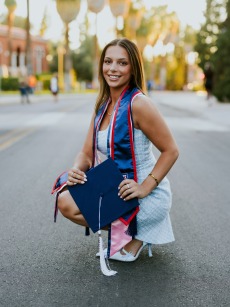
Gina Freese was an education fellow at Teach For America Ignite where she gained skills in leadership and adaptability while teaching math to 5th graders from Makaha Elementary School in Hawaii.
How did you get your internship?
I learned about the Teach For America Ignite Fellowship through a sorority sister who shared it with our chapter. I was immediately drawn to the opportunity and knew I wanted to apply. I had previously taught during the summer and had a tough experience, but I felt like this would be different. I had hopes that I would feel more focused, more supportive, and more rewarding. After submitting my application, I went through orientation and training modules, which helped me feel fully prepared before meeting my students. Getting selected felt like a huge opportunity to redeem my previous teaching experience and grow in ways that aligned with my goals.
Why did you choose this internship?
Although my long-term career goal is to work in marketing, I chose this internship because it offered me real-life experience in communication, leadership, and relationship-building; skills that are essential in any field. I was also really drawn to the mission of Ignite: closing equity gaps in education by providing high-impact, small-group tutoring to underserved students. It is a very similar approach to the organization I worked with a few summers ago. Working with students from BIPOC and low-income communities felt meaningful to me. I wanted to mentor, empower, and build trust with them in a way that made a difference. This internship aligned with both my values and the kind of professional growth I wanted.
What kind of work did you do throughout your internship experience?
As an Ignite Fellow, I worked with two 5th-grade students, virtually tutoring them in math. Every session required 1–2 hours of prep, including building PowerPoints, finding instructional videos, creating worksheets, and developing fun interactive games using tools like Blooket and Kahoot. I focused heavily on relationship-building and making math engaging. I adapted each lesson based on their learning styles, used an iPad to collaborate in real time, and even incorporated storytelling and real-life examples to boost understanding. Over the semester, I saw my students grow more confident and invested, which was the most fulfilling part of the work.
What is unique about your situation that influenced your internship selection or experience?
A couple of summers ago I worked as a full-time teacher but I didn’t see myself returning to the classroom in that same environment. I had a challenging experience with a large class of kindergarteners, which made me really appreciate the small group model that Ignite offers. The time difference between Arizona and Hawaii also added a layer of complexity as I had to carefully manage deadlines and session times three hours apart. I committed to perfect attendance, even scheduling around breaks and holidays to make sure I could be there for my students. This internship allowed me to combine past experience with new opportunities for growth in a more balanced and focused way.
What new skills did you practice and develop in this internship?
Throughout this internship, I strengthened my adaptability, patience, and time management skills in major ways. I learned how to differentiate instruction, pace lessons strategically, and adapt on the fly when technical issues or emotional challenges came up. I became more confident in planning, revising, and reflecting, skills that will serve me in any collaborative or project-based career like marketing. Communication was also huge: I learned how to give clear directions, create engaging content, and make space for student voice. Above all, I developed a deep sense of empathy and leadership through the relationships I built with my students.
How was the internship related to your Applied Humanities degree?
This internship embodied the Applied Humanities values of creativity, empathy, interdisciplinary problem-solving, and real-world impact. I had to understand the cultural, social, and emotional contexts of my students while also designing learning experiences that met academic goals. The students I taught were in a low funded school district and part of a community where education is seen as pivotal to their success as a person. It was all about connection, something we talk about a lot in Applied Humanities. I was solving problems, building relationships, and adapting based on feedback, which felt exactly like the kind of human-centered work we study in this major. The internship gave me a space to apply theory to practice.
How did your Applied Humanities major coursework help prepare you for the internship experience?
Courses in intercultural competence, communication, and community-based engagement helped me bring a thoughtful, student-centered approach to each session. I understood how to foster belonging and respond to diverse needs thanks to my coursework. My Applied Humanities background also helped me reflect critically on the experience itself. I wasn’t just going through the motions, I was constantly evaluating what was working, what wasn’t, and why. This mindset of iterative learning helped me create better outcomes for my students and grow in the process.
What was the most satisfying part of your internship?
One of the most satisfying moments was when one of my students, who had been quiet and hesitant all semester, wrote in their reflection that “math feels less scary now.” That line brought tears to my eyes because it validated every lesson plan, every adjusted strategy, every moment of patience. I also loved seeing both students light up during our math games—they even requested a replay of one of my review games because they enjoyed it so much. Seeing learning transform from a source of stress to a space of joy reminded me of why I chose to do this work. It showed me that even small actions can have a huge ripple effect.

